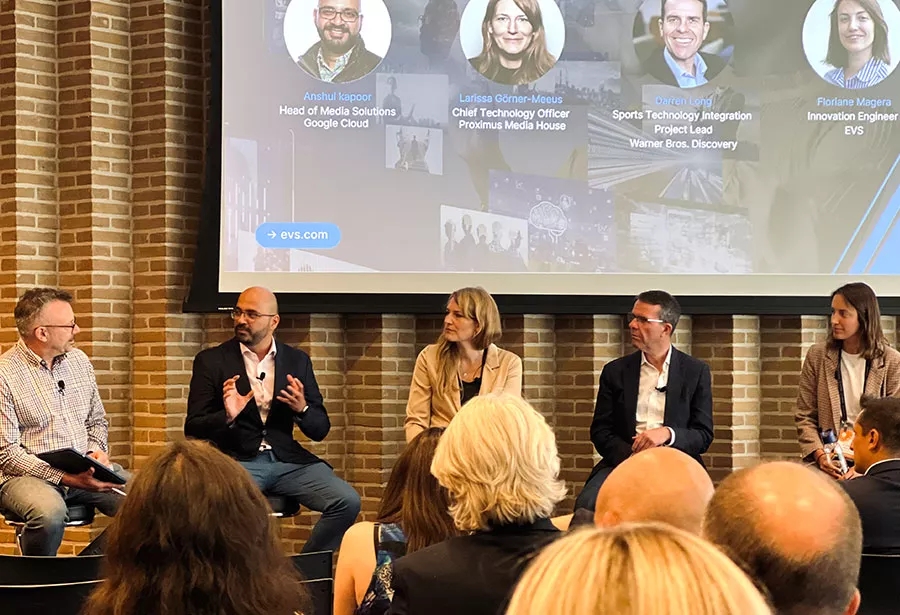Insights from the EVS Tech Dynamics panel sessions - by Tony Gregory
- 10 October 2023

The session "AI and storytelling. You're not alone" featured speakers Anshul Kapoor (Google Cloud), Larissa Görner (Proximus Media House), Floriane Magera (EVS) and Darren Long (Warner Bros. Discovery). For the session "Cloud. Green or Grey?" I was joined by Eirik Nakken (NEP Norway), Rohan Mitchell (EMG), Anshul Kapoor (Google Cloud), Serge Van Herck (EVS), and Thomas Mueller (Qvest Group).
The "AI and storytelling . You're not alone" session, sparked an engaging conversation, offering valuable insights:
All four panelists have experience deploying AI, typically for speeding up laborious and reactive tasks. They shared their learning with us. Anshul Kapoor from Google Cloud urges us to experiment, be playful and to share our discoveries, but advises a responsible approach. Proximus CTO Larissa Görner stressed that AI lacks the ability to process culture and that human judgment remains vital - AI won't always be right. EVS AI innovation engineer Floriane Magera explained that generative AI, rooted in datasets and probabilities, can't match the nuanced emotional depth a skilled human actor brings to a movie. Warner Brothers-Discovery's Darren Long urged us to be brave and try things, and that companies need to empathise with people's sentiments toward AI.
All agreed that we are at the beginning of a lengthy journey and that companies and universities must invest in AI training and research, because the skills mix for our industry will change in the coming years. People will have more supervisory roles, and must at least understand the principles, risks and management of AI.
We asked the audience how they perceive the impact of AI on our industry, and the overwhelming majority in the room felt it would be "mostly positive".
Finally, for a bit of fun, we questioned ChatGPT about AI's limitations. The answer was surprisingly reassuring: "AI lacks the capacity for emotional consciousness, empathy, and the depth of feeling that defines human emotional experiences. While AI can simulate emotional responses based on data and algorithms, it fundamentally lacks the subjective, lived experiences that make emotions uniquely human."
I left the panel feeling hopeful. AI is going to handle tasks we dislike or don't have time to do, unlock new possibilities, and venture into unimagined territories. How exciting! It can't do emotion - that's what we, humans do. And that's good news for the people in an industry built on storytelling - as long as we move forward in a people-centric way.
The panel discussion "Cloud. Green or grey" was important. The horrific scenes of the effects of climate change that the world has seen this year are shocking reminders of the urgency for us to get to net zero - the content industry as much as any other.
Given that moving around 1GB of data can create 1kg of carbon emissions (source: SeenThis), what we do with our data matters. The sheer volume of data we generate is staggering, much of it unfortunately going to waste.
While it's simple to grasp the idea of conserving power by turning off devices, the concept of optimizing data and processing efficiency to save power (thus emissions) feels so removed from our personal interactions that we feel we have little agency over it. Especially if it's in the cloud.
Our panelists represented a range of content industry tech providers. NEP and EMG have been increasingly working with remote production. NEP's Eirik Nakken said deployments in private cloud had proven best for them, particularly as they deployed efficient FPGA tech. EMG, says Rohan Mitchell, has started monitoring emissions throughout the value chain, and revealed that the biggest cause of carbon in production is travel (including to/from work).
Anshul Kapoor said that as public cloud, Google offers full reporting to clients on emissions, with a menu of trade-offs for performance vs. cost vs. carbon. Europe is leading on pressure to report emissions says Serge Van Herck from EVS, who offers both on-prem and cloud solutions - he says minimising emissions will mean a balance of both. Qvest provision both cloud and on-prem, said Thomas Mueller and talked about data wastage, and reminded us that most AI is in the cloud, and even experimenting with it is processing-intensive, and therefore power intensive.
The panel was clear: we have to work in partnership across supply chains to account for emissions, train people to play their part, and realize that each project requires a tailored blend of solutions.
We asked the room; "what would you sacrifice to reduce emissions from data usage (latency, price, security, flexibility, or none of the above)?". The answers were evenly split, apart from one person, who said they would sacrifice data security. Initial reaction was surprise. Who would sacrifice data security?
I suspect that person might argue that if you'd lost your town to rising seas, what use is data security? In the context of an existential threat, we're going to have to be radical.
Tony Gregory is a highly experienced live and multi-camera TV director. Work includes concerts, major shows, and formats such as The Voice, Big Brother, LEGO Masters, Pop Idol. He also trains live directors. Tony consults worldwide on formats, programme development, production strategy & workflow for several international tech and production companies. He lectures on the Media Technology degree course at the St Pölten University of Applied Sciences in Austria.

Tony Gregory (LinkedIn)
Live multi-camera director, consultant & coach